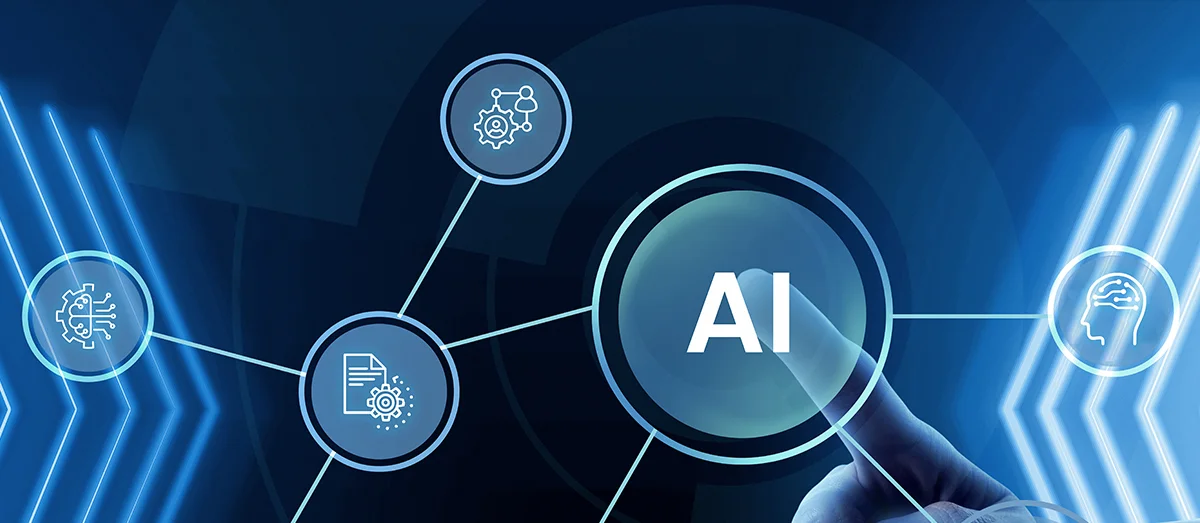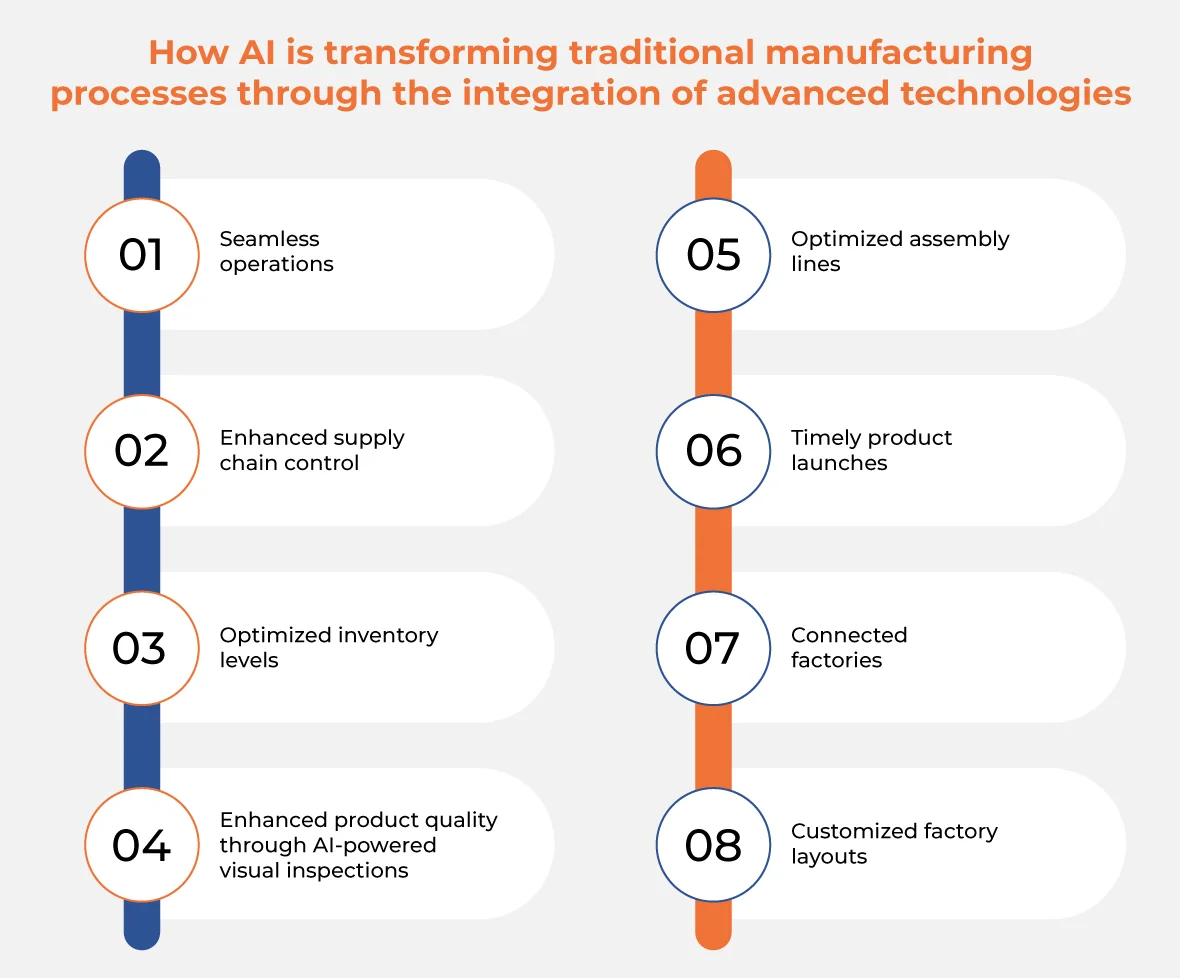The global Artificial Intelligence (AI) market in manufacturing is expected to reach $20.8 billion by 2028, with a CAGR of 45.6% during the forecast period (2023-28).
AI is transforming the manufacturing industry like never before, enhancing employee productivity, driving innovation, improving operational efficiency, and unlocking growth opportunities.
Today, the power of AI can be witnessed in various manufacturing scenarios, from sensors for self-driven vehicles and advanced robotics to predictive maintenance and real-time monitoring of production lines.
AI-powered enhancements are paving the way for superior production methods, reduced operational costs, enhanced product quality, and increased competitiveness in the global market.
AI-driven digital transformation utilizes advanced automation technologies, including machine learning (ML) and neural networks, to optimize manufacturing processes.
Manufacturing companies experience further acceleration when they combine AI with automation tools such as Low-Code Process Automation (LPA), Robotic Process Automation (RPA), and Intelligent Document Processing (IDP). These tools serve as critical enablers for end-to-end process automation.
This holistic approach to intelligent automation enables businesses to streamline complex processes.
For instance, combining these complementary automation technologies can automate tasks in the accounts payable process—from issuing purchase orders to processing payments and ERP data entry.
Understanding the Impact of AI in Manufacturing
AI is often combined with RPA and IDP to automate repetitive tasks, optimize production schedules, and minimize errors, ultimately leading to increased productivity and cost savings in the manufacturing industry.
Let’s explore how AI is transforming traditional manufacturing processes through the integration of advanced technologies:
1. Seamless operations: Businesses are increasingly turning to AI, RPA, and IDP solutions to minimize disruptions in manufacturing processes. These disruptions can lead to costly delays, decreased productivity, and inferior product quality. Additionally, disruptions can impact supply chains, resulting in missed deadlines and lost revenue opportunities.
AI tools can operate 24/7 without the need for breaks, ensuring consistent performance and non-stop production capability. By mitigating labor shortages and improving cost-effectiveness, AI contributes to seamless manufacturing operations.
2. Enhanced supply chain control: Manufacturers are looking to mitigate logistics delays and disruptions, ensuring that production schedules remain unaffected. AI software can efficiently manage orders from warehouse to shipping address, elevating customer satisfaction to unprecedented levels.
AI helps resolve supply chain stress by using automation to handle challenges such as:
- Shipment delays: AI predictions can warn of shipment delays and provide advance notification of congested ports. Freight providers can then offer manufacturing companies more accurate and informed shipping services.
- Slow shipping times and high costs: AI software can help select the most efficient shipping method for manufactured products at optimal rates, avoiding unnecessary next-day or specialty service charges for customers.
- Time-consuming paperwork: Shipping companies often spend significant man-hours analyzing orders received through emails. AI can be partnered with RPA, Natural Language Processing (NLP), and IDP to automate paperwork, providing companies with instant and valuable data to make informed shipping decisions.
3. Optimized inventory levels: Manufacturers aim to maintain optimal inventory levels to fulfill orders while minimizing excess inventory that ties up capital and incurs storage costs.
AI, along with LPA and RPA, helps businesses track inventory seamlessly from production to the point of sale, allowing for real-time monitoring of inventory levels, orders, sales, and deliveries.
AI tools can provide timely updates about low stock levels and accurately predict customer demand, facilitating the movement of goods to replenish inventory across multiple locations.
4. Enhanced product quality through AI-powered visual inspections: Manufacturing businesses often seek AI solutions to implement rigorous quality checks to ensure their products meet required standards and specifications.
AI tools such as Computer Vision systems use deep learning algorithms to analyze images and identify defects in manufactured goods. Manufacturers can easily detect defects or discrepancies in the process and rectify them, ensuring only high-quality products reach the market and enhancing customer satisfaction and brand reputation.
5. Optimized assembly lines: Efficient assembly lines ensure timely production, reduce waste, and improve product quality. However, manufacturing businesses often need help to optimize assembly lines due to complex production processes, varying product specifications, and changing market demands.
AI tools use algorithms to analyze sensor inputs and past data to minimize downtime and boost workflow efficiency. These tools can identify anomalies, ensure product quality, and reduce material waste.
AI-based innovations in the manufacturing industry have transformed assembly lines into adaptive environments that offer higher output and cost-effectiveness.
6. Timely product launches: During the critical product development and design phase, AI tools can assist manufacturers by recommending solutions that meet evolving customer demands, reducing time-to-market while maintaining high-quality standards.
AI algorithms can extract insights from competitors, customers, and market trends. These tools can create several product iterations to arrive at the most optimized design solution, ensuring faster launch-to-market for innovative products.
7. Connected factories: Manufacturers are shifting to connected factories that rely on AI to ensure uninterrupted data sharing between people, sensors, and machines. These factories use AI to gather real-time data from machinery, reducing downtime and accelerating productivity. IoT sensors further ensure seamless operations.
8. Customized factory layouts: Manufacturers often struggle to design floors for optimal efficiency. Poor layouts can create bottlenecks that impact productivity, contribute to safety hazards, increase lead times, and raise production costs.
AI can adapt layouts to meet evolving product demands. AI tools provide real-time views of layouts, helping to identify inefficiencies and clear bottlenecks.
Nividous Intelligent Automation Platform: The Future of Manufacturing Innovation
Nividous has partnered with numerous companies worldwide, helping them overcome unique business challenges. Our comprehensive Intelligent Automation platform combines the power of RPA, AI, and LPA to drive efficiency and productivity in manufacturing.
- Nividous RPA Bots automate repetitive, rules-based tasks.
- Nividous Smart Bots/IDP/AI handle document-centric processes, extracting semi-structured and unstructured data from various sources. This native capability can be extended to mobile devices.
- The LPA allows companies to orchestrate work between bots and humans with an intuitive human-in-the-loop interface, ensuring seamless collaboration.
Moreover, our customers have seen significant returns on investment within months, with a significantly lower total cost of ownership and improved process throughput. The automation has enabled enhanced auditing and compliance and better experiences for employees and customers.
Nividous Success Stories in Manufacturing
Let’s explore how manufacturing businesses have leveraged the Nividous cutting-edge platform to transform their operations. These real-life success stories showcase the practical applications of these technologies and their impact on manufacturing efficiency and productivity.
| 1. Client: A leading manufacturing company backed by two decades of digital building and electrical infrastructure expertise. The organization delivers customized offerings to residential and commercial businesses.
Challenge: The client manually processed over 20,000 invoices from more than 400 vendors monthly. The process was complex, costly, error-prone, and labor-intensive. Solution: End-to-end AP process automation spanning multiple plant locations and vendors. A few automation highlights:
Results: The automation enabled a 90% reduction in human errors, 98% accuracy in data extraction, and seamless collaboration between bots and employees, ensuring efficient task orchestration. |
| 2. Client: The company is a high-tech manufacturer delivering world-class products, revolutionizing how people combine virtual and physical worlds.
Challenge: Highly skilled employees spent significant time on manual processes such as job requisitions, purchase orders, invoice reconciliations, and contract compliance, which affected product launches. The client needed to automate these processes to expedite time to market. Solution:Nividous automated over 20 business processes, streamlining operations across HR, administrative, accounts, and purchasing departments. Key automated processes included hire-to-retire, contract management, purchase order requests, invoice reconciliation, and shipment tracking. RPA bots automated job requisitions, saving over $90,000 annually, while end-to-end automation of shipment tracking and invoice reconciliation enhanced control and visibility. Results: The automation increased process efficiency and visibility, reduced operational costs by 40%, and accelerated process turnaround time by 60%. |
Ready to experience the Nividous automation platform firsthand?
Request a demo now and discover how our comprehensive solution can streamline your processes and drive business growth!





